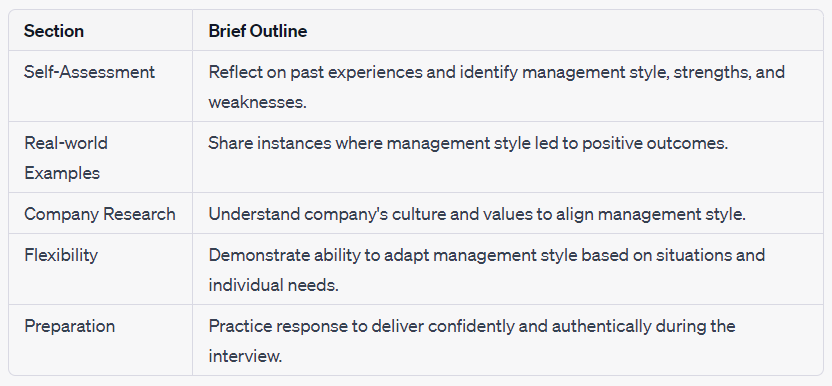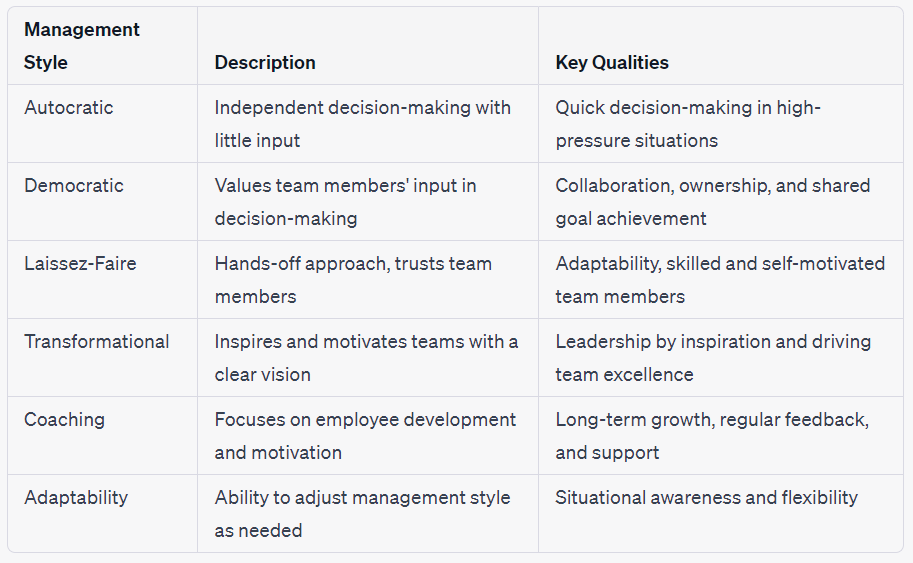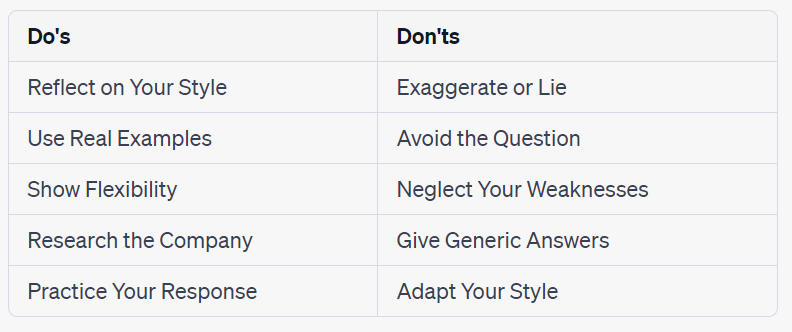How To Answer “What is Your Management Style?” + 10 Powerful Examples
The question “What is your management style?” or variations of it is a common query posed during job interviews, particularly for roles requiring leadership or management skills. This question provides the interviewer with an insight into your leadership style and how you motivate employees, handle decision-making processes, and foster a positive work environment.

Understanding the Question – What is Your Management Style?
During a job interview, the “management style” question often arises. It’s important to understand that this question addresses more than just how you handle direct reports. In fact, it speaks to your overall approach to tasks, decision-making, problem-solving, and how you cultivate a collaborative, engaging environment.
Approach to Tasks
When discussing your management style, be sure to touch on how you approach tasks. Do you prefer a hands-on or hands-off approach? How do you prioritize tasks and delegate responsibilities? Sharing your approach can help interviewers understand how you manage your workload, how you organize your team, and how you ensure everyone is working towards the same goals.
Decision-Making
Your approach to decision-making is another crucial aspect of your management style. Do you involve your team in decision-making processes, or do you make decisions independently? Providing insight into your decision-making process can help interviewers understand your leadership style and how you handle high-pressure situations.
Problem-Solving
How you handle problems that arise within your team is also an essential part of your management style. Do you encourage your team to come up with solutions, or do you take a more hands-on approach? Discussing your problem-solving approach can help interviewers understand how you work through challenging situations and how you cultivate a collaborative team environment.
Company Culture
Interviewers are eager to understand if your management style will align with the company culture and meet the needs of your potential team members. Before your interview, research the company culture and values to get a sense of how you can tailor your responses to showcase your fit within the organization.
When answering the “management style” question, it’s essential to understand the various aspects it covers. Be sure to discuss your approach to tasks, decision-making, and problem-solving, in addition to considering how your management style aligns with the company culture. By showcasing your management style thoroughly, you can demonstrate your leadership abilities and show potential employers why you would be a valuable asset to their team.
Here are some helpful job interview related blogs
- Tackling the final interview round
- How to answer ‘tell me about yourself’
- What are your career aspirations
- Why do you want this job
- Why should we hire you
- Why are you leaving your job
- What are you passionate about
- Strengths and Weaknesses In Interview
- Interview questions for managers
- What is your management style
- Interview questions for freshers
- Tips to succeed in a job interview
- Types of interview questions
- Interview questions to ask candidates
- Behavioural interview questions
- Walk me through your resume
- What makes you unique
- What are your goals
- How do you handle stress and pressure
- Are you a team player
- How did you hear about this position
- Where do you see yourself in five years
- How do you handle stakeholders
How to Formulate Your Response

When asked about your management style in a job interview, it’s important to provide an answer that is both truthful and aligns with the company’s values. This requires thoughtful reflection and understanding of not only your own management style, but also the dynamics of the company you are interviewing for. Here are some key steps to help you formulate an effective response:
Self-Assessment
Begin by conducting a thorough self-assessment. Reflect on your past experiences in leadership roles, and analyze your actions and decisions. What tendencies did you exhibit? Did you lean more towards being a democratic leader or an autocratic one? Once you’ve identified your natural management style, consider its strengths and weaknesses. How has it helped you succeed in the past, and what challenges have you encountered because of it? This introspection will help you understand and articulate your personal management style effectively.
Real-world Examples
Providing real-world examples can strengthen your claims about your management style. Think back to instances where your approach to management led to positive outcomes, such as resolving team conflicts, achieving project goals, or improving team performance. Sharing these stories can illustrate your management style in action and help the interviewer envision how you’d perform in a leadership role or management position within their organization.
Company Research
An understanding of the company’s culture and values can help you align your management style with their expectations. Research the company thoroughly; learn about their mission, values, and work environment. Then, tailor your response to show how your management style can contribute to the company’s success. For instance, if the company values innovation and autonomy, you could discuss how your laissez-faire management style fosters these qualities.
Flexibility
In today’s dynamic work environment, flexibility in management style is highly valued. Show that you’re not rigidly attached to one style but instead can adapt your approach based on different situations, team dynamics, and individual needs. Discuss instances where you’ve adjusted your style and the positive impact it had on the team or project outcome.
Preparation
Finally, preparation is key to delivering your response confidently. Once you’ve identified your management style, gathered relevant examples, researched the company, and thought about your flexibility, practice your response. This will help you speak smoothly during the interview and prepare you for any follow-up questions. Remember, clarity and authenticity are crucial when discussing your management style.
Various Types of Management Styles
In the professional world, particularly during job interviews for roles involving leadership or management responsibilities, understanding different management styles is paramount. Your comprehension of these common management styles can significantly impact your performance in an interview, especially when faced with questions like “What is your management style?”.

Autocratic Management Style
The autocratic management style involves making decisions independently with little input from team members. While it may not be your preferred style, recognizing when it is effective, such as in high-pressure situations requiring quick decision-making, can impress interviewers with your awareness of varied management approaches.
Democratic Management Style
The democratic management style values team members’ input in decision-making, fostering collaboration and ownership. Demonstrate knowledge of this visionary management style and its benefits to show potential employers that you understand the value of team involvement in achieving shared goals.
Laissez-Faire Management Style
This hands-off style requires managers to trust their team members to perform tasks independently. Recognizing this style and understanding when to use it (such as when leading highly skilled, self-motivated individuals) can highlight your ability to adapt your management style based on your team’s capabilities.
Transformational Management Style
Transformational managers inspire and motivate their teams, often communicating a clear vision for the company’s future. Understanding this style can show interviewers that you know how to lead by inspiration and motivation, driving team members to exceed their expectations for the benefit of the company.
Coaching Leadership Style
Employee development and motivation are two critical aspects of effective management. Employing a coaching management style is one way to achieve these goals. Managers with a coaching style are focused on the long-term development of their team members, providing regular feedback, training, and day-to-day support. Being able to discuss this style effectively can demonstrate to interviewers that you understand the importance of personal growth and career development in building a competent, motivated team.
Successful Leaders Adapt Their Management Style
In addition to the coaching management style, successful leaders adapt their management style based on the situation, team needs, and organizational culture. Demonstrating knowledge of different leadership styles and their benefits can show potential employers that you can adapt your management style based on the situation.
As you prepare for your interview, reflect on these management styles and consider which ones resonate most with your approach. Remember, most successful leaders don’t strictly adhere to one style; instead, they adapt their management style based on the situation at hand, the needs of their team, and the broader organizational culture.
When asked about your management style in an interview, use this knowledge to craft a well-rounded response that shows your flexibility and understanding of effective management. Share specific examples from your past experience to illustrate your style in action and the positive results it achieved. These could range from improved team performance, increased employee morale, or successful project outcomes.

Sample Answers
Here are some sample answers to the question, “What is your management style?”. It’s common to have mixed styles of management style. You don’t need to necessarily align yourself to one particular style.
Situational leadership style
People are different, so is the needed style of leadership. While I have a heavy leaning towards XYZ style of management, I remind (or at least try to) myself of what the situation demands. I also ask my team to remind me if I’m working against my promise. For example, if my teams like a transformational management and I seem to be very directive, then I expect my team to remind me of our mutual promise to be honest with each other.
Democratic Management
“I embrace a democratic and collaborative management style, valuing my team’s input and striving to incorporate their ideas into our strategies. This approach has led to innovative solutions and a high level of team investment in our projects.”
Transformational Management
“I’d describe my style as transformational. I aim to inspire and motivate my team to reach their full potential. For example, in my last role as a marketing team leader, I implemented regular one-on-one development meetings, which resulted in improved performance and job satisfaction.”
Democratic & Transformational
“I would describe my management style as a blend of democratic and transformational. I believe in fostering a collaborative environment where everyone’s ideas are valued and considered. I also strive to inspire and motivate my employees work as team towards shared goals, helping them see the big picture and their role in achieving it. For instance, in my previous role, I included my team in strategic discussions and also set clear visions for our projects, which led to increased team engagement and productivity.”
Autocratic & Laissez-Faire
“While I understand the importance of taking charge and making decisions when necessary, I also value the autonomy and expertise of my team members. I’ve found that this balance allows me to provide clear guidance when needed but also empowers my team to take ownership of their work. This approach was particularly effective in my last role when working with a team of highly skilled and self-motivated individuals.”
Transformational & Coaching
“I adopt a combination of transformational and coaching styles in my management approach. I aim to inspire my team with a clear vision and also focus on their individual growth and development. I believe that by helping team members develop their skills and capabilities, we can not only achieve our immediate goals but also prepare for future challenges.”
Democratic & Autocratic
“I believe in involving my team in decision-making processes to foster a sense of ownership and collaboration. However, I’m also comfortable making tough decisions quickly when the situation calls for it. This balanced approach has allowed me to build strong, productive teams that feel involved yet have clear direction.”
Remember, the key to answering this question effectively is to be authentic and align your response with your actual management style. Use specific examples from your past experience to illustrate your style in action and the positive results it achieved.
Common Do’s and Dont’s

Do’s
Reflect on Your Style
Spend time understanding your own management style by reflecting on past experiences and feedback.
Use Real Examples
Provide specific examples from your previous roles to illustrate your management style in action.
Show Flexibility
Demonstrate your ability to adapt your management style to different situations and individual needs.
Research the Company
Understand the company’s culture and values, and show how your management style aligns with them.
Practice Your Response
Practice your answer to ensure you present it confidently and coherently during the interview.
Don’ts:
Exaggerate or Lie
Be honest about your management style. False claims can easily be uncovered during reference checks or after you start the job.
Avoid the Question
If you’ve never been a manager before, you can still have a management style. Think about how you manage projects, tasks, or even people in non-work settings.
Neglect Your Weaknesses
Every management style has its downsides. Acknowledge these but also discuss how you’re working to improve.
Give Generic Answers
Avoid vague or clichéd phrases like “I’m a people person”. Instead, give a detailed explanation of your style and how it impacts your team.
A good manager adapts their style to meet their team’s needs. Show that you’re willing to adjust your approach for the benefit of the team.

Conclusion
The question, “What is your management style?” offers an opportunity to showcase your management skills and how they align with the company’s needs and culture. By reflecting on your style, providing concrete examples, and demonstrating adaptability, you can turn this question into an opportunity to distinguish yourself from other candidates.
Here are some helpful career/leadership related blogs
- Careers– Agile Coach, RTE, Product Owner, Scrum Master, QA Manager
- Career development plan
- Career growth
- Career change at 40
- Project Management
- Managing Managers
- IT Career switch
- Software Engineering career path
- Agility, Agile Testing
- Remote leadership / Leadership traits / Agile leadership
Other Productivity / Tools posts that may interest you
- Productivity
- Book summary apps – Headway App vs Blinkist vs getAbstract
- AI Writers: / Blogging – Jasper, Writesonic, Article Forge , Copy AI, Anyword, Writecream, Copymatic, Quillbot, Peppertype, Jasper AI (pricing) &
- Work From Home tools: Jabra
Author also writes at his Medium site.





